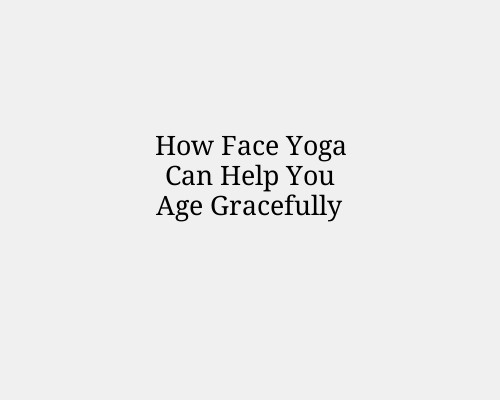
How Face Yoga Can Help You Age Gracefully
As the beauty industry continues to push an endless array of creams, serums, and surgical interventions, a growing number of people are turning to a more natural, non-invasive alternative: face yoga. Designed to strengthen and tone the muscles of the face, face yoga is gaining attention as a tool for graceful aging. The practice involves a series of facial exercises that engage specific muscles to improve circulation, boost collagen production, and enhance facial symmetry. While it won’t eliminate deep wrinkles overnight, consistent practice may offer noticeable long-term benefits.
What Is Face Yoga?
Face yoga combines facial exercises with mindful breathing and massage techniques. Just as traditional yoga tones and strengthens body muscles, face yoga targets the more than 50 muscles in the face and neck. These muscles are often underused or only partially engaged in daily expressions. Over time, underused muscles can weaken, leading to sagging skin, drooping eyelids, and deepening wrinkles.
Face yoga seeks to counteract these effects by stimulating and toning facial muscles. Exercises typically involve exaggerated facial movements, resistance techniques, and targeted stretches. For example, lifting the cheeks by smiling widely while resisting with the fingers, or puckering the lips in different directions to work surrounding muscles.
Benefits of Face Yoga
Improved Muscle Tone and Definition
One of the primary benefits of face yoga is the visible toning of the facial muscles. Just as a fitness routine sculpts the body, regular facial exercises can help define the jawline, lift the cheeks, and firm the neck area. With age, muscle volume and skin elasticity naturally decline. Face yoga helps counteract this by keeping facial muscles active and engaged, promoting firmness and structure.
Enhanced Blood Circulation
Facial exercises boost blood flow to the skin’s surface, increasing oxygen and nutrient delivery to skin cells. This can result in a healthier, brighter complexion. Better circulation also supports skin regeneration, helping to reduce dullness and promote a more youthful glow.
Stimulation of Collagen and Elastin Production
The repeated movements and stretching involved in face yoga can stimulate the production of collagen and elastin—proteins essential for skin’s firmness and elasticity. As we age, natural production of these proteins decreases, leading to sagging and fine lines. Face yoga encourages their renewal, which may help slow down the visible signs of aging.
Reduction of Tension and Facial Stress
We often carry stress in our facial muscles without realizing it—tight jaws, furrowed brows, and clenched expressions. Face yoga incorporates gentle massage and relaxation techniques that can help release this tension. This not only feels good but may prevent the formation of expression lines caused by repetitive stress.
Natural Facial Symmetry
Asymmetry is common in the face due to lifestyle habits, dominant sleeping positions, or even chewing preferences. Face yoga can help balance uneven features by strengthening weaker muscles and improving overall facial symmetry.
Face Yoga vs. Cosmetic Procedures
While face yoga won’t provide the immediate results of Botox or fillers, it offers a non- invasive, risk-free alternative with long-term benefits. Cosmetic procedures often focus on surface-level changes or temporarily paralyzing muscles to reduce wrinkles. In contrast, face yoga addresses the underlying muscle structure and encourages natural rejuvenation.
It’s important to manage expectations—results take time and consistency. Most practitioners report visible changes after 6 to 10 weeks of daily practice, with sustained improvements over months.
Sample Face Yoga Exercises
Here are three beginner-friendly face yoga exercises that target common aging concerns:
Cheek Lifter
Smile as wide as possible, lift your cheeks toward your eyes.
Place your fingers lightly on your cheekbones and hold the position for 10 seconds.
Release and repeat 10 times.
This helps firm the cheeks and reduce sagging.
Forehead Smoother
Place your fingertips on the center of your forehead.
Apply gentle pressure as you sweep your fingers outward to the temples.
Repeat 10 times, focusing on releasing tension. This can reduce the appearance of forehead lines.
Neck and Jaw Firmer
Tilt your head back and look toward the ceiling.
Pucker your lips and stretch them toward the ceiling as far as possible.
Hold for 5 seconds and repeat 10 times. This strengthens the neck and jawline area.
Tips for Effective Practice
Consistency is key: Aim for 15–20 minutes of daily practice.
Use a mirror: This helps ensure you’re performing the exercises correctly.
Warm up and cool down: Start with light massage to relax the face and finish with gentle stretching.
Pair with skincare: Perform face yoga after applying moisturizer or serum to avoid tugging on dry skin.
Stay relaxed: Avoid excessive strain—movements should be controlled and intentional.
Scientific Support and Skepticism
The scientific research on face yoga is still emerging. A notable 2018 study published in JAMA Dermatology showed that middle-aged women who practiced facial exercises for 20 weeks experienced improved upper and lower cheek fullness. However, broader studies are needed to confirm long-term efficacy and understand mechanisms in more detail.
Skeptics argue that overuse of facial muscles could potentially increase wrinkles, especially if exercises are performed incorrectly. This is why learning from a trained practitioner or using reliable guides is essential. Like any exercise program, technique and consistency determine the outcome.
Conclusion
Face yoga is a promising natural method for those looking to age gracefully without surgery or injections. It strengthens muscles, enhances circulation, and promotes a healthier, more toned appearance. While it may not replace medical treatments for everyone, it’s a valuable addition to any holistic skincare routine. With patience and practice, face yoga can help maintain facial vitality and support long-term skin health.